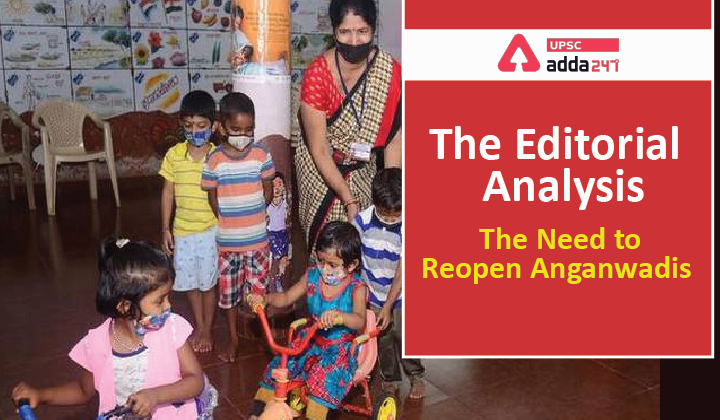Table of Contents
The Need to Reopen Anganwadis- Relevance for UPSC Exam
- GS Paper 2: Welfare schemes for vulnerable sections of the population by the Centre and States and the performance of these schemes;
- Mechanisms, laws, institutions and Bodies constituted for the protection and betterment of these vulnerable sections.
The Editorial Analysis- Births and Rights
The Need to Reopen Anganwadis- Context
- Karnataka, Bihar and Tamil Nadu are opening or considering opening their anganwadis shortly. The anganwadis were closed since the April 2020-lockdown.
- Their closure significantly impacted service delivery and weakened an important social safety net.
The Editorial Analysis- Small Grant but a Big Opportunity for Local Bodies
The Need to Reopen Anganwadis
- About: Anganwadis are created as a part of the Integrated Child Development Services (ICDS). ICDS covers about 88 million children aged 0-6 years in India.
- Key Function: anganwadis play a crucial role in supporting households, particularly from low-income families, by providing childcare, health and nutrition, education, supplementary nutrition, immunisation, health check-up and referral services.
- Need for Re-opening of Angnawadis:
- According to National Family Health Service (NFHS)-5 data, in 2019-20, less than 15% of five-year-olds attended any pre-primary school at all.
- An estimate shows that the time women spend on unpaid work may have increased by 30% during the pandemic.
- In a COVID-19 rural household surveys across eight States, 58% of women cited home-schooling as the biggest contributor to increase in unpaid work.
The Editorial Analysis- Measuring Progress
The Need to Reopen Anganwadis- Key Significance
- Child welfare: Surveys by IDinsight across five States in November 2018 and November 2019 found that anganwadi workers were a primary source of nutrition information for families.
- The National Education Policy, 2020, places anganwadis at the centre of the push to universalise access to early childhood care and education (ECCE).
- Promote Economic activity: Sending younger children to anganwadis will free up women’s time, including for economic activities.
- Crucial for Early childhood Development: As platforms for early childhood education and nutrition support, anganwadis can play an important role for children to achieve their potential.
The Editorial Analysis: Falling Short
The Need to Reopen Anganwadis- Associated Challenges
- Lack key Knowledge: A 2018-19 survey found that among mothers listed with anganwadi workers, knowledge about key health behaviour such as complementary feeding and handwashing was low, at 54% and 49%.
- Lack of proper training: Anganwadi workers often do not have the support or training to provide early childhood care and education (ECCE).
- Burden of Administrative work: Administrative responsibilities take up significant time, and core services like pre-school education are deprioritised.
- A typical worker spends an estimated 10% of their time (28 minutes per day) on pre-school education, compared to the recommended daily 120 minutes.
- Poor Infrastructure: NITI Aayog found that only 59% of anganwadis had adequate seating for children and workers, and more than half were unhygienic.
- Poor utilization of Anganwadi services, especially in Urban areas: According to NFHS- 4 data, in urban areas, the utilisation of early childcare services at anganwadis is only 28%, compared to 42% for rural areas.
The Editorial Analysis: Dynamism in India-U.S. ties
The Need to Reopen Anganwadis- Way Forward
- Invest resources: India must invest robustly in the Anganwadis that is the world’s largest social programme on early childhood services.
- Universalize the access to early childhood care and education (ECCE): In this context, recently, government proposed a phased rollout of ECCE program across all anganwadis, covering one-fifth each year, starting from 2021-22.
- Promote home visits: Studies in Odisha and Andhra Pradesh (and globally) have found that home visits, where volunteers work with children and caregivers, significantly improved cognition, language, motor development and nutritional intake while also reducing stunting.
- Promoting home-based newborn and young child care: they need to extend beyond the first few months of a child’s life, with seamless coordination with anganwadi workers.
- Renumeration and career opportunities of Anganwadis: many States will have to improve career incentives and remuneration for anganwadi workers.
- Deployment of Additional Anganwadi workers: A recent study in Tamil Nadu found that an additional worker devoted to pre-school education led to cost-effective gains in both learning and nutrition.
The Need to Reopen Anganwadis- Conclusion
- As the world’s largest provider of early childhood services, anganwadis perform a crucial role in contributing to the life outcomes of children across India.
- To improve these outcomes, we need to invest more significantly in anganwadis, and roll out proven innovative interventions.




 TSPSC Group 1 Question Paper 2024, Downl...
TSPSC Group 1 Question Paper 2024, Downl...
 TSPSC Group 1 Answer key 2024 Out, Downl...
TSPSC Group 1 Answer key 2024 Out, Downl...
 UPSC Prelims 2024 Question Paper, Downlo...
UPSC Prelims 2024 Question Paper, Downlo...





